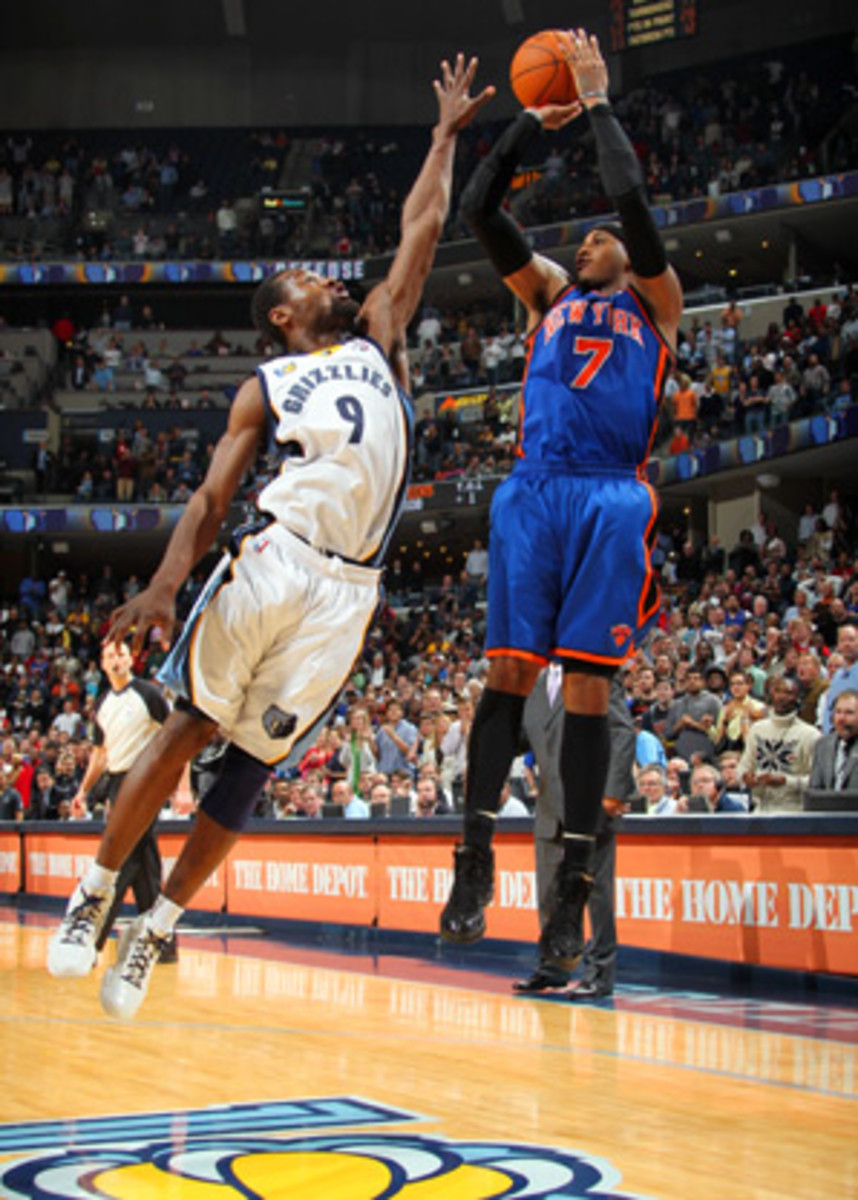
When 'Melo returns, who takes last shot? How about who's open?
A month ago, even Jeremy Lin didn't know who Jeremy Lin was. Now Lin is playing like a star, as long as you ignore all those times he gives the ball to the other team, and I am perfectly happy ignoring that, because life is more fun this way.
Meanwhile, Carmelo Anthony is about to return from an injury. This should be good news -- the Knicks are paying Anthony a lot of money to play basketball, so you would think every Knicks fan would want him to, you know, play basketball. But Anthony expects to be a star, too. And this brings us to the question that has be been asked 14 million times since a nation turned its lonely eyes to Lin:
When Carmelo comes back, and the Knicks need a bucket, who gets to take the shot?
"Of course I want to take the last shot," Anthony told ESPN recently, in a rare case of a player in street clothes asking for the ball. "Let's be quite frank: I've been doing for nine years already, and I've made a ton of them."
He has indeed. We can debate whether Anthony is a great all-around player, but there is no doubt that he is a great scorer. He is a great choice to take the last shot.
But I have a crazy, groundbreaking idea:
How about ... whoever is open?
What if -- this is complicated, people, but please bear with me -- the Knicks consider their opponent and the game flow, evaluate matchups, figure out who has the best chance of scoring, and run a play, without worrying about salaries or egos or whose team it is supposed to be?
This concept of one guy being THE GUY to take the last shot is ridiculous, and it is not just a Knicks concept. It is an NBA concept. Basketball is a five-on-five game. But in the NBA, the idea of who gets to take the last shot usurps the principles of basketball, as well as common sense.
It has become a question of manhood, heroism and egos, instead of about trying to get a basket to win. It hurts the game, and just as importantly: It hurts the teams that believe in it.
Why would you want to rely too heavily on one guy to take the last shot? Do the New York Giants decide that, in the fourth quarter, they will only let Eli Manning throw to Victor Cruz, because it's their team? Does Justin Verlander decide that in the seventh inning, he'll only throw fastballs, because that's his pitch?
This is just as ridiculous. NBA defenses are more sophisticated than they have ever been. If you ever watch a game from the 1970s or '80s, you will see a lot of basic man-to-man defense -- even when an All-Star scored 40 points, he might not have seen much double-teaming. Back then, it probably made sense to have one guy take the last shot most of the time.
The notion became bigger in the '80s with Larry Bird, whose quick release and dead aim made him the ideal guy to hit a late shot, and of course became much bigger with Michael Jordan. Jordan's late-game aura was so great that it hung over the Bulls even when he was playing baseball. In the 1994 playoffs, Scottie Pippen refused to re-enter a game when Phil Jackson had the gall to draw up the last play for Toni Kukoc. (Thankfully for everybody involved, Kukoc drained it.)
Reggie Miller was no Jordan, but he sometimes seemed like Jordan at the end of games. He was an incredible clutch shooter; like Bird, he was tall for a three-point shooter, and extremely tough mentally, and he wanted to take that shot.
But these days, scouting and video preparation are far more advanced. Everybody knows everybody's tendencies. That makes it harder for one player to dominate in late-game situations. Of course, when you're going for the last shot, somebody has to start with the ball in his hands. Still, there are so many ways to go besides a one-on-one play to win it.
The idea that one clutch player should be The Man actually works against clutch play.
Exhibits A, B and C in this argument are Kobe Bryant. He is an alltime great, a champion, etc. Many people think of Kobe as the greatest clutch shooter of his generation. (The fact that he may be the greatest PLAYER of his generation has something to do with this.) Yet, recent statistical studies suggest that he is actually not clutch at all.
How can this be? Is Kobe actually a bad clutch player? I think it depends on how you define that. We normally think of chokers as guys who don't want to shoot, and obviously, that isn't Kobe. I don't think he gets nervous or worries about failing. It seems quite obvious that he wants the ball with the game on the line.
And that is the problem. I think that is why Bryant isn't a great clutch player. He forces too many shots in clutch situations, because he wants to decide the game. His opponents all know this. That is why they gear their defense toward stopping him from shooting. Kobe shoots anyway, because that is who he is. His belief in himself, in these moments, is why he has maximized his outrageous talent.
The results should not surprise anybody. When an NBA defense is trying to stop one guy, and that one guy is determined to shoot anyway, of course his success rate will go down. Even if he is one of the best scorers in NBA history.
There is a lesson there if Anthony wants to learn it. He can be a clutch shooter -- but not if he takes every shot in the clutch.





